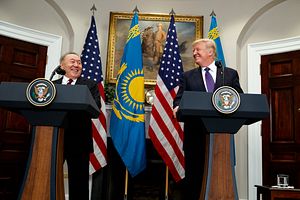On January 16, Kazakh President Nursultan Nazarbayev made an official visit to Washington DC, meeting U.S. President Donald Trump at the White House. The two presidents made brief remarks for the White House press corps and a longer set of joint statements.
The two presidents discussed an “enhanced strategic partnership” between the United States and Kazakhstan, resolving to strengthen cooperation “on political and security issues, trade and investment, and people-to-people relationships through regular high-level meetings within the framework of an Enhanced Strategic Partnership Dialogue.”
“Kazakhstan is doing very well. They’re really — they’ve turned things around,” Trump said, lauding Nazarbayev’s leadership, which has now stretched to 28 years.
Nazarbayev, in turn, congratulated Trump on his first year in office. “And that year was very productive, and you achieved a lot for your country,” he said.
In both sets of statements — before and after their meeting — the two presidents were complimentary of each other.
The contents of their discussion trended toward the predictable: economic matters like bilateral trade and investment, the war in Afghanistan, and nuclear non-proliferation.
On trade and investment, Trump lauded Nazarbayev’s vision of making Kazakhstan a top 30 global economy by 2050 (“And he’s on his way, very rapidly”), and hailed Astana’s efforts to improve its business climate.
Nazarbayev said he would be attending a roundtable at the U.S. Chamber of Commerce in the evening of January 16 to discuss the technical modernization of the Kazakh economy and oversee the signing of 20 commercial contracts worth $7.5 billion. While there are not yet details on those 20 commercial contracts, Trump and Nazarbayev both mentioned American companies such as Chevron, ExxonMobil, General Electric and Boeing which have long had interests in Central Asia. Much American investment in Kazakhstan stems from the big business of energy: oil and gas being the primary drivers of the Kazakh economy and Chevron running lead on an expansion of production at the Tengiz field.
(Side note: the reception mentioned by Trump and Nazarbayev was publicized on the U.S. Chamber of Commerce website last week but has since been removed from the public events calendar, though the page is still live without the registration option).
On Afghanistan, Trump thanked Nazarbayev for his “full support” of the administration’s South Asia strategy, including “personal assurances” that Kazakhstan would continue to provide “critical logistical support and access for our troops fighting ISIS and the Taliban.” The strategic partnership statement noted Kazakh support for an Afghan-led and Afghan-owned peace process and Astana’s commitment to provide additional support to address security challenges in Afghanistan, including a program to train civilians and security personnel in Kazakhstan.
On North Korea — a decidedly hot topic — Trump said “Kazakhstan is a valued partner in our efforts to rid the Korean peninsula of nuclear weapons.” When Nazarbayev got around to the issue of North Korea, he said Kazakhstan’s voluntary surrendering of the world’s fourth largest nuclear arsenal shortly after independence gave the country the “moral right” to talk to countries seeking nuclear weapons, such as Iran and North Korea. Further, Nazarbayev said “I think the North Korea issue can be solved by joining efforts between the United States, China and Russia.”
Neither president took questions after the their joint press statement, but Trump did (somewhat) answer two shouted questions during the first set of remarks, the first about Norway and the second about Kazakh money in the Trump Soho building.
“Mr. President, is there any Kazakh money in Trump Soho?” a reported shouted as administration aids tried to clear the room. “No idea. Really no idea,” Trump said.
The question was in reference to the Trump Soho building in New York City which was developed by Trump with Bayrock Group LLC. Bayrock was founded and run by Tevfik Arif, who is the target of a 2010 lawsuit brought by Bayrock’s former finance director alleging that, as Bloomberg stated it, “a confidential informant alleged that $10 million in equity contributions to Bayrock came from Arif’s brother.” This reference, however, was dropped from later versions of the lawsuit after a court ruled that parts of the complaint had been improperly obtained.*
Trump has maintained his ignorance regarding his former business partners. The Financial Times reported in October 2016, that Trump said in a 2011 deposition relating to a dispute over a Fort Lauderdale real estate project with Bayrock that he had “never really understood who owned Bayrock.”
Felix Sater, former managing director of Bayrock Group LLC and advisor to the Trump Organization, reportedly helped the family of Viktor Khrapunov, former mayor of Almaty, Kazakhstan’s old capital and largest city, invest millions in U.S. real estate — including Trump SoHo — through front companies. Sater, reportedly agreed to cooperate with “an international investigation into the alleged money-laundering network” stemming from Bayrock.
Obviously, none of this was mentioned in the public statements between the two presidents. Human rights issues, from media freedoms to issues of religious tolerance, went unmentioned, but this is par for the course.
Back in 2006, when last Nazarbayev was welcomed to the White House, then-President George W. Bush said “we talked about our commitment to institutions that will enable liberty to flourish” and said he appreciated Nazarbayev’s leadership.
*Correction: This paragraph has been updated to reflect corrections to the linked Bloomberg article in reference to the lawsuit brought by Bayrock’s former finance director.

































